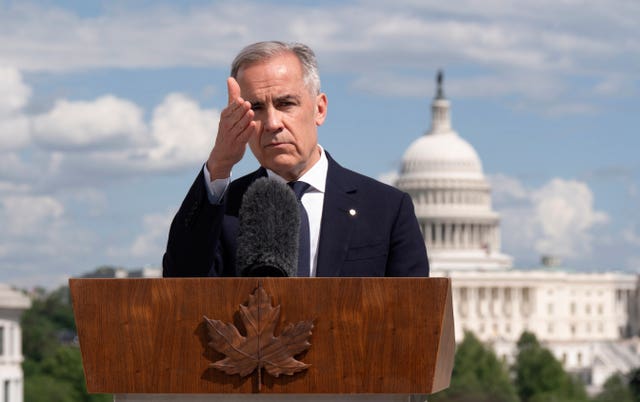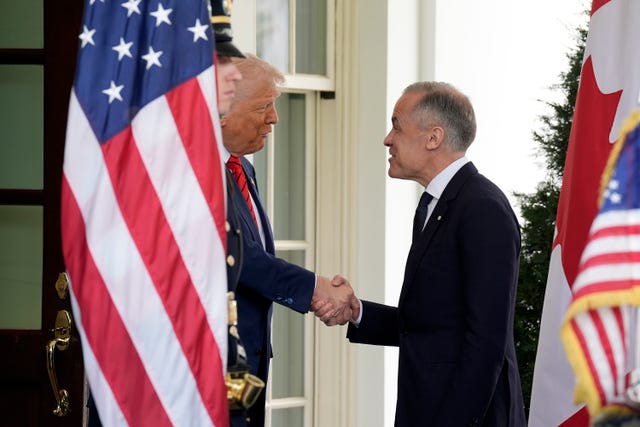Carney and Trump remain apart on tariffs and 51st state after White House talks
The meeting between the two leaders showcased the full spectrum of Mr Trump’s unique mix of aggression, hospitality and stubbornness.

US president Donald Trump and Canadian prime minister Mark Carney faced off in the Oval Office and showed no signs of retreating from their gaping differences in an ongoing trade war that has shattered decades of trust between the two countries.
The two kept it civil, but as for Mr Trump’s calls to make Canada the 51st US state, Mr Carney insisted his nation was “not for sale” and Mr Trump shot back: “Time will tell.”
Asked by a reporter if there was anything Mr Carney could tell him to lift his tariffs of as much as 25% on Canada, Mr Trump bluntly said: “No.”
The US president added for emphasis “just the way it is”.

Mr Carney acknowledged that no bit of rhetoric on tariffs would be enough to sway Mr Trump, saying that “this is a bigger discussion”.
“There are much bigger forces involved,” the Canadian leader continued.
“And this will take some time and some discussions. And that’s why we’re here, to have those discussions.”
The meeting between the two leaders showcased the full spectrum of Mr Trump’s unique mix of aggression, hospitality and stubbornness.
Shortly before Mr Carney’s arrival, Mr Trump insulted Canada by posting on social media that the United States did not need “ANYTHING” from its northern neighbour, only to then turn on the charm and praise Mr Carney’s election win in person before showing his obstinance on matters of policy substance.
Mr Carney won the job of prime minister by promising to confront the increased aggression shown by Mr Trump, even as he has preserved the calm demeanour of an economist who has led the central banks of both Canada and the United Kingdom.

At times, Mr Carney struggled to interject his views and raised his hand to talk as Mr Trump held forth at length and veered between topics, touching on California Democratic governor Gavin Newsom, Mr Carney’s predecessor, Justin Trudeau, and teasing a “great” upcoming announcement that is “not necessarily on trade”.
Mr Trump offended Canada’s sense of pride and friendship by saying he wants to make Canada the 51st US state and levying steep tariffs against an essential partner in the manufacturing of cars and the supply of oil, electricity and other goods.
The outrage provoked by Mr Trump enabled Mr Carney’s Liberal Party to score a stunning comeback victory last month as the trade war and attacks on Canadian sovereignty have outraged voters.
Mr Trump said the two would not discuss making Canada part of the US, even as he insisted the idea would lead to lower taxes for Canadians.
“It’s not for sale,” Mr Carney said. “It won’t be for sale. Ever. But the opportunity is in the partnership and what we can build together.”
Mr Trump persisted by saying that the United States did not want to buy cars from Canada, even if the vehicles were also assembled in America.
The US leader insisted that the 63 billion dollars trade deficit in goods — which he inflated to 200 billion dollars — was a subsidy that needed to come an end.
Mr Carney later described his conversation with Mr Trump as “wide ranging” and “constructive,” telling reporters that the prospect is there for positive negotiations but there would be “zigs and zags.”
Mr Carney said he stressed the value that Canadian companies and factories created for US automakers while stressing that it was unfair to assume one meeting could resolve any differences.
“I wouldn’t have expected white smoke coming out of this meeting,” Mr Carney said after the Tuesday meeting, referencing the signal that a new pope has been selected.
Mr Carney said that he privately asked Mr Trump to stop calling Canada the 51st state during their meeting. But when pressed on how Mr Trump responded, the Canadian prime minister said: “He’s the president. He’s his own person.”





